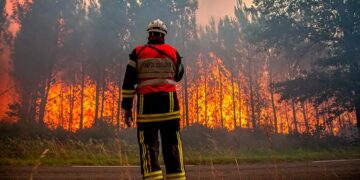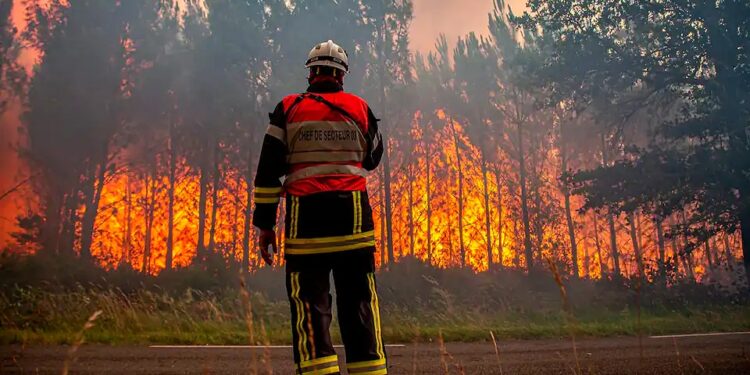By John Ikani
Thousands of firefighters are continuing to battle wildfires in Portugal, Spain, France and Greece as a heatwave shows no sign of easing.
The blazes have ravaged thousands of hectares of land and killed several personnel since the start of the week.
It is the second heatwave engulfing parts of southwest Europe in weeks as scientists blame climate change and predict more frequent and intense episodes of extreme weather.
In northern Portugal, a pilot died when his waterbombing plane crashed in the Foz Coa area, near the Spanish border.
More than 1,000 firefighters worked alongside ordinary Portuguese citizens desperate to save their homes on Saturday after a long week of battling multiple blazes around the country.
The Portuguese authorities say at least 238 people have died from the heat over the past week.
Fires are ravaging areas of France’s south-western Gironde region, where over 12,000 people have been evacuated.
Around 3,000 firefighters supported by water-dumping planes battled the wildfire in southern France as they sought to save as many homes as possible.
Across the border, firefighters in Spain struggled to contain several blazes, including two that burned around 7,400 hectares of land.
The nearly week-long heatwave has caused 360 heat-related deaths in Spain, according to figures from the Carlos III Health Institute.
In Greece, the civil defence rushed to douse flames raging on the Mediterranean island of Crete, while Morocco was battling a deadly forest fire in its northern mountains.
Meanwhile, in the United Kingdom, government ministers are to hold crisis talks after the state meteorological agency issued a first-ever “red” warning for extreme heat, cautioning there is a “risk to life”.
The Met Office said in southern England temperatures could exceed 40C on Monday or Tuesday for the first time, leading some schools to say they will stay closed next week.
What’s fueling the heatwaves?
Heatwaves have become more frequent, more intense, and last longer because of human-induced climate change.
The world has already warmed by about 1.1C since the industrial era began and temperatures will keep rising unless governments around the world make steep cuts to carbon emissions.
“All heatwaves studied so far in Europe are getting warmer,” said Robert Vautard of the Pierre-Simon Laplace Institute at the Sorbonne University.
“As long as greenhouse gas emissions are not reduced to zero, heatwaves will continue to intensify, become more frequent and last longer.”



































